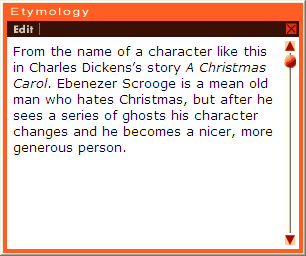|

FROM THE EDITOR
 In
this Issue In
this Issue
 Contributors Contributors
 Letters
to the Editor Letters
to the Editor
 Write
to Us Write
to Us
 Spread
the Word Spread
the Word
 Back
Issues Back
Issues
 Index Index
FEATURE
 Crib
notes, copying Crib
notes, copying
and dictionary use
Lindsay Clandfield explores
the difference between
self-teaching and cheating
COLUMNS
 Metaphor Metaphor
What we talk about
when we talk about
honesty and dishonesty
 Focus
on Language Focus
on Language
Study:
Introduction
Collocation
Less fixed combinations
and functional expressions
UK version ¦
US version
 New
word of the month New
word of the month
Proper nouns and new words
 Top Tips for the CD-ROM Top Tips for the CD-ROM
Using MED CD to explore
background information
 onestopenglish.com onestopenglish.com
|
 |
Top Tips for the CD-ROM
by Mairi
MacDonald
As the New Word of the
Month column shows, proper nouns, especially names of people and locations,
are one way for new words to enter the English language. Eponyms outgrow
their original use and are often used metaphorically. Some words such
as Jeeves and Fleet Street are peculiar to British English,
while other entries such as those relating to classical mythology, folk
tales and the Bible will be more familiar to students. Some examples e.g.
spam will probably be understood by students but they won't necessarily
be aware of the history behind the word.
The Macmillan English Dictionary has additional
etymological and cultural information that can be easily extracted from
the CD-ROM. There are 175 entries with additional etymological information.
In addition there are 28 entries with cultural notes. This background
information represents an alternative approach to learning vocabulary:
students have to work with the new vocabulary in a way that uses dictionary
look-up skills and promotes reading for gist and information. It also
gives plenty of scope for discussion afterwards, and is a great way of
showing students that dictionaries can be used for much more than just
checking spelling!
1 Finding and extracting the background
information
To find entries containing etymology and cultural information,
open SmartSearch and select More search options. Check the
Editorial notes box and select Cultural Note and Etymology,
then click on Go.

Scroll through the search results on the left and select
an entry. The Etymology or Cultural Notes box will be to the right of
the entry.
Expand the Etymology box by clicking on the small square
in the top right corner of the orange box. This is the Etymology box for
scrooge:

Select Edit to copy the text. This information
can now be pasted into your worksheets.
2 Activities
The following activities use material taken from the Macmillan
English Dictionary CD-ROM and refer to entries relating to names,
places and references to television or film that have become words in
their own right.
Activity 1
Procedure: Students first predict the answers and
then check their answers in the dictionary. This can be done using either
the book or CD versions of the Macmillan English Dictionary.
|
Activity
1
Decide if the following words come from mythology,
folk tales, literature, the Bible or popular culture (e.g. television,
films or music). Work with a partner and complete the table. Then
check your answers in the dictionary.
Adonis Armageddon
babel Batman Bollywood Cassandra
Cinderella Damascus Falstaffian Jeeves
Job Judas Kafkaesque Hitchcockian
Lilliputian Motown Orwellian romeo Samson
Star Wars
|
Greek mythology
|
folk tales/literature
|
the Bible
|
popular culture
|
|
|
|
|
|
Answers
|
Activity 2
Procedure: Students try to match the definition
on the right with the headword on the left. Make sure students are aware
of the answers before going on to the second part.
|
Activity
2A
Match the definition on the right to the word on
the left.
|
Armageddon |
something that is very difficult to achieve |
|
blarney |
if someone has the _____ touch, they succeed easily at everything
they do |
|
Cinderella |
emails that are sent to large numbers of people on the Internet,
especially when these are not wanted |
|
Everest |
a type of African-American soul music from the US city of Detroit,
popular in the 1960s and 1970s |
|
Fleet Street |
someone or something that has good qualities but is treated
badly or ignored |
| 6 Kafkaesque |
someone who hates spending money |
|
Midas |
the British newspaper industry |
| Motown |
a friendly way of talking to people and saying nice things about
them that makes it easy to persuade people to do what you want |
|
scrooge |
a battle in the future that will destroy the world |
|
spam |
complicated, confusing, and threatening |
Answers
|
|
Activity
2B
Use the words 1—10 in Activity 2A to complete
these etymological notes.
From _______
Record Company, the company that first recorded the music.
_________ is
the main character in a famous children's story. She is a poor girl,
badly treated by her stepsisters but, in the end, thanks to the
power of magic, she is able to marry the rich attractive Prince
Charming.
From ______,
the trade name for a US type of cooked meat that is sold in tins.
Because people had to eat so much of it during the Second World
War, it became the object of many jokes.
From Mt _______,
the highest mountain in the world.
From the name
of the Czech-German writer Franz ______. For the characters in _____'s
novels, the world seems mysterious and unfriendly, and it becomes
very difficult to achieve things.
___________ is
mentioned in the Bible as the place where the final battle between
good and evil will be fought.
The offices of
most national newspapers were in this street in central London in
the past. Although most of them have now moved to other parts of
London, especially Docklands to the east, the phrase '_______ ________'
is still sometimes used for referring to the newspaper industry.
From the name
of a character like this in Charles Dickens's story A Christmas
Carol. Ebenezer _______ is a mean old man who hates Christmas,
but after he sees a series of ghosts his character changes and he
becomes a nicer, more generous person.
From the '________
Stone', a large stone in ________ Castle in Ireland. Some people
believe that if you 'kiss the _______ Stone' you will be given the
ability to persuade people.
In Greek mythology,
______ was a king who was given the power of turning everything
he touched into gold.
Answers
|
Activity 3
Procedure: Students discuss whether the following
phrases have a positive or negative meaning. Students should work in pairs
to predict the answer then consult their dictionaries to check. Some are
open-ended and will prompt further discussion.
|
Activity
3
Discuss whether these phrases have positive or negative
meanings. Look up the words in bold to help you.
Uncle Tom
Stepford Wives
Tower of Babel
ugly duckling
never-never land
Gengis Khan
artful dodger
the Black Hole of Calcutta
Barbie doll
Walter Mitty
Fort Knox
Good Samaritan
Murphy's Law
like painting the Forth Bridge
Fawlty Towers
|
Extension activity
Procedure: Students discuss the following questions
in pairs or small groups.
|
Activity 4
1. How many of the words and phrases in activities
1 to 3 are used in your own language?
2. Do they mean the same thing?
3. Are there any phrases in your own language that are different
to the ones that you have looked at but mean the same thing?
|
|





